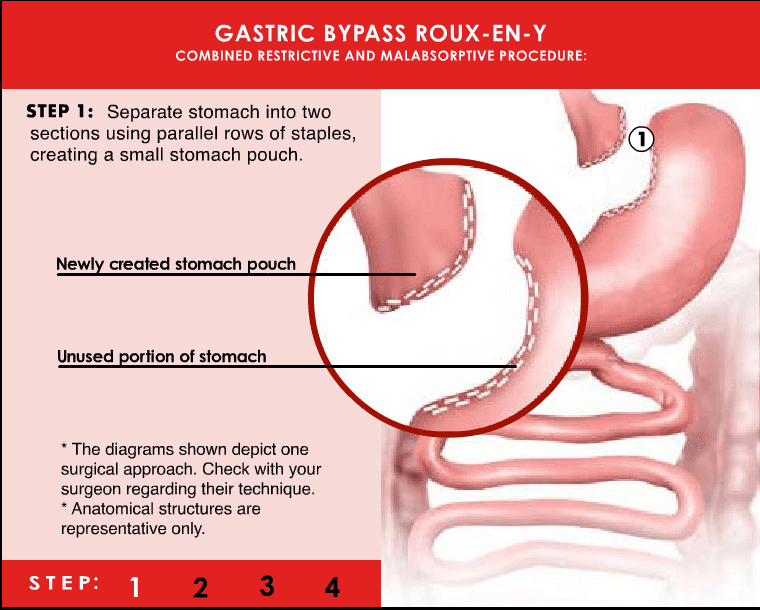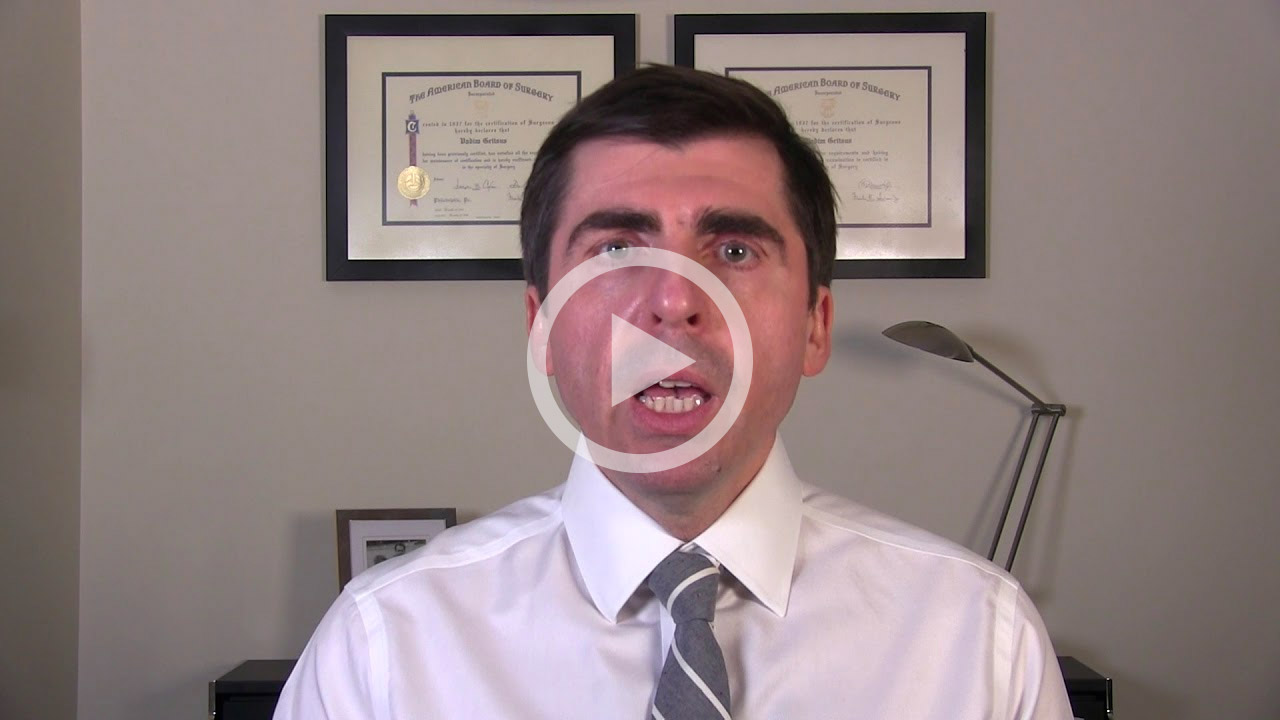What is a Gastric Bypass?
Gastric Bypass or "Laparoscopic Roux-n-Y Gastric Bypass" has been around for over 60 years. It began as an "open" surgery (big incision) and now is performed via small incisions due to surgical and technological advances, much like all other surgeries on this site.
The idea behind our Gastric Bypass in New Jersey is to increase satisfaction with small portions and decrease feelings of hunger, thereby resulting in a reduction in the number of calories a person is consuming. This is accomplished by surgical alteration of the stomach and intestines.
How a Gastric Bypass Works
- First, a small pouch is made by separating it from the rest of the stomach. The small pouch allows a person to feel full after just several bites of food.
- Second, the intestines are re-routed and connected directly to the pouch, "short circuiting" or "bypassing" parts of the stomach and intestine.
This new configuration allows for much slower absorption of food, thus keeping a person satisfied with a very small meal. In other words, a saucer size plate of food will make you feel like a Thanksgiving dinner. You are full after just several bites! As an added benefit, the gastric bypass redirects certain hormones in the body, making it easier to control diabetes.

Is the Gastric Bypass Right for You?
While many people find themselves struggling with their weight, a Laparoscopic Roux-n-Y gastric bypass surgery is not for everyone. Most candidates for our gastric bypass surgery in NJ are at least 75 pounds overweight with a body mass index (BMI) of 40 or higher. Some people who fall slightly below these thresholds may also be good candidates for a gastric bypass if they are suffering from obesity-related health conditions such as diabetes or high blood pressure. Your surgeon will also recommend blood tests, diabetes glucose testing, urinalysis and heart check-ups before scheduling your gastric bypass surgery.
To determine if you are a good candidate for gastric bypass surgery, several issues are evaluated, including:
- Any serious medical conditions affecting your health or wellbeing. All medical conditions and prescription medications you are currently taking will be reviewed by our team to determine if the procedure is safe for you.
- Your nutrition and weight throughout your life will also be evaluated. Your weight, eating habits, level of exercise, and other factors will be reviewed to determine your propensity to lose weight without surgery and maintain a healthy lifestyle after surgery.
- Your mental health can be indicative of your success after surgery. Certain psychological conditions may contribute to your level of obesity, and you may need help to shift to a healthier, happier lifestyle.
- Your motivation to succeed will be an important factor in your gastric bypass journey. After the surgery is complete, you will be following certain guidelines and recommendations to maintain your weight loss. Your motivation to do so is vital to your success and maintaining a healthy weight for the long term.
What are the risks of Gastric Bypass?
The Gastric Bypass is very powerful, and as with any powerful treatment it should be treated as such. Anyone who chooses to undergo a Gastric Bypass should be prepared to take vitamins and certain supplements for the rest of their lives. It sounds pretty basic, but failure to do so can lead to severe consequences. To monitor a patient's health after Gastric Bypass we order blood work once or twice a year. Also, the Gastric Bypass will make it difficult for a person to digest sugar because of "dumping.”
What is "dumping?"
"Dumping" is a combination of side effects that occur in gastric bypass patients who ingest sugar. I prefer calling this process a "sugar allergy.” The reason behind dumping is that sugar is digested in the stomach. The smaller the stomach, the less sugar can be digested. In gastric bypass patients the stomach is made very small--the size of a shot glass. Because of the small stomach, gastric bypass surgery patients are not able to digest sugar. The undigested sugar can then be "dumped" into the intestine, which is ill-equipped to process it. As a result, there is a massive shift of fluid in the intestine, resulting in nausea, lightheadedness and diarrhea. These symptoms can last for 1-2 hours after eating sugary meals. In some cases, a dumping episode can last longer. While dumping is not harmful, it can be unpleasant. Our New Jersey Gastric Bypass patients are encouraged to follow a strict diet to avoid dumping.
Is it possible to lose too much weight after gastric bypass?
Absolutely. Because the gastric bypass is very powerful it can cause malnutrition and a vitamin deficiency if patients are not following their prescribed diet carefully. Because the absorption of calories is significantly reduced, the foods consumed after gastric bypass have to have good nutritional value. If patients eat junk food, they will not get adequate nutrition and their body will eventually starve. In addition, after a New Jersey gastric bypass, patients must take vitamins and iron supplements daily and weekly to keep up with their body requirements. This is very easy to do, but diligence is required.
We recommend one multivitamin tablet daily, plus one tablet of B complex. Iron should be taken at least 2-3 times a week, especially in women, and vitamin D should be taken weekly.
Life after Gastric Bypass
After gastric bypass surgery in NJ, patients should have blood work at least once a year, which should include levels of vitamin B1, B3, B6, B12, A, E, D and Folate as well as CBC, iron profile, Ferritin levels, albumin levels and PTH. Electrolytes should be checked via CMP as well as levels of Zinc and Copper. Your vitamin intake can be adjusted based upon your blood work results.
Our New Jersey Gastric Bypass patients have to follow a certain recommended diet, more information can be found here. The procedure of the gastric bypass is carefully tested upon completion to ensure that there is no leak. Once you return home to heal and commit to your new lifestyle is when everything will start to change!
Recovery After Gastric Bypass
After surgery, you will have a small recovery period to allow for proper healing of your incisions. You may have a strict diet to follow while your body adjusts to the changes, and you will be able to slowly transition to a more normal diet as time goes on. You will start to notice weight loss almost immediately after surgery. Your smaller stomach and restricted diet will start to yield results very quickly. You will need to maintain a healthy diet after your surgery to maintain your results.
Returning to your old eating habits may cause your stomach to stretch and you can begin to gain weight again. However, gastric bypass surgery tends to alleviate cravings for unhealthy food, so making better choices is typically easier than before. Because of the smaller size of your stomach and portions, you may also need to begin a regimen of multivitamins or other supplements to ensure you are getting the proper nutrients.
You will also notice a dramatic difference in your overall health shortly after your surgery. Many patients see significant improvements in health conditions such as:
- Asthma
- Diabetes
- Heart disease
- High blood pressure
- Acid reflux
- Migraines
- Non-alcoholic fatty liver disease
- Sleep apnea
- Orthopedic or joint problems
- Metabolic syndrome
- Depression
Exercising after Gastric Bypass Surgery
Adopting an exercise routine will not only help you maintain your weight loss, but it will also contribute to your overall strength, positive attitude, and healthy lifestyle. An exercise program also serves to help you overcome certain health problems.
Because of the dramatic changes to your physical appearance, your physical and mental health, and your improved lifestyle, most of our patients feel great hope and excitement about life ahead. Your continued success is a priority, and as part one of the best Gastric Bypass New Jersey has to offer, Dr. Gritsus continues his support and care by monitoring your condition with follow-up visits at our office.
What Will the Gastric Bypass Cost?
Gastric bypass surgery is typically covered by insurance, if you qualify. Gastric bypass surgery has to be done at a hospital and therefore is more costly than the gastric sleeve.
The CPT code for gastric bypass is 43644.

Contact Us Today
In a nutshell, the Laparoscopic Roux-n-Y gastric bypass is a "heavy duty" procedure that can offer amazing results but must has to be approached with care. Improve your health and lose excess weight with the assistance of Dr. Gritsus and the caring, compassionate team of professionals at Advanced Surgical Solutions. You can learn more by viewing our online seminar. Feel free to contact us today and schedule a consultation with Dr. Gritsus for arguably the best gastric bypass surgery NJ has to offer.
Schedule a Consultation Today
Call today to schedule a private consultation in New Jersey


